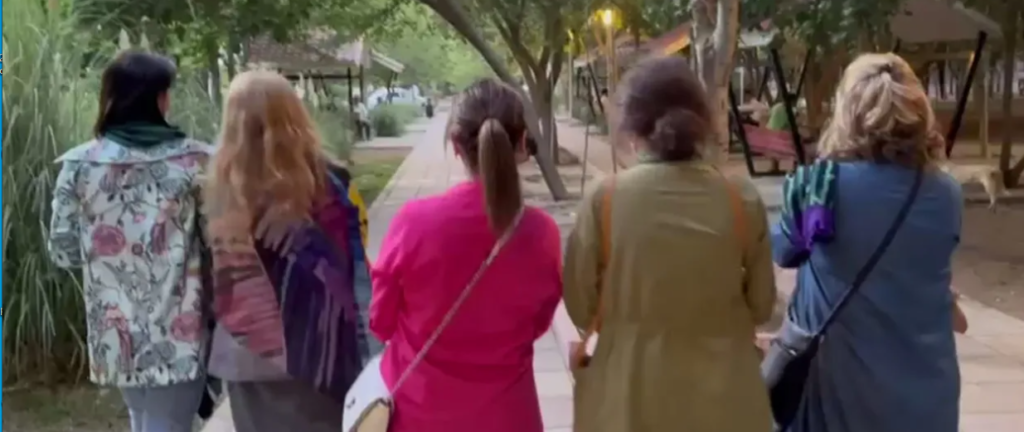July 29, 2022

support for the rule requirjng heads to be covered. Here is how some women observed that day, enflaming hardliners.
President Raisi has ordered a crackdown on women who do not adhere strictly to the dress code, charging that the frequent violations of the rules have been organized by the Americans to promote moral corruption in Iran. The concern over women has now reached such an extent that the government has banned women from appearing in any commercial advertisements.
In a meeting with officials July 6, Raisi called the lack of compliance with hejab rules “an organized promotion of [moral] corruption in Islamic society.” He said that this departure from the norm had been organized “by world arrogance,” a reference to the United States in particular and the West in general.
A stricter enforcement of the rules normally begins every spring as women face higher temperatures and seek lighter clothing. The same was true this year, but Raisi says he wants still stricter enforcement.
Raisi chose to put an ideological spin on the issue: “The enemies of Iran and Islam, using extensive satellite TV and social media networks, have targeted society’s cultural backbone and the foundations of its religious values.”
Supreme Leader Ali Khamenehi later made the same point in a speech to Friday prayer leaders, suggesting that Raisi was not acting on his own initiative.
There is no evidence of any conspiracy by foreign governments. However, a number of Iranian expatriates living in the West campaign loudly against compulsory hejab. One such activist in the United States, Masih Alinejad, was targeted for kidnapping by Islamic Republic agents, the United States has charged.
Street patrols by the “chastity police” have intensified in recent weeks with women with loose headscarves being subjected not only to verbal harassment but also to physical force, some in Iran have charged.
To promote greater compliance with the dress code, the regime proclaimed July 12 to be Hejab and Chastity Day. But women opposed to the dress code used that day to protest by going out in public with uncovered hair. Social media were filled with photos of such women. It was impossible to know how widespread the protests were, but they were large enough for the regime to feel challenged and to start arresting violators the next day. There were no known arrests on the day of the protests, presumably because the regime did not want to give attention to the protests.
Esmail Rahmani, the deputy public prosecutor in Mashhad recently ordered the municipality to prevent women who don’t abide by the dress code from using public transportation, including the Metro, and threatened to take legal action against officials who fail to do so. He has also ordered the governor to ban services in banks and government offices to women whose hair is not fully covered.
The governor general of Fars Province, Mohammad-Hadi Imanieh, has also ordered the heads of government organizations to enforce the dress code. Imanieh has said that government employees who are not willing to abide by the rules should take leave without pay and only return to work “when they can respect the law.”
In the most highly publicized confrontation, a woman on a Tehran bus removed her head covering and exposed her hair. Another woman, wearing a chador, began shouting at her and raised her cellphone to film this indiscretion. The chador-less woman also raised her cellphone and began taking video of the other woman with her phone raised. A shouting match ensured, ending only when several women passengers grabbed the woman in the chador and forced her off the bus.
The chador enforcer was recorded on the videos saying, “You send my video to Masih Alinejad [the US-based anti-hejab activist]. She can’t do anything to me. But I’ll send your video to the Pasdaran. Let’s see what they’ll do to you.” The woman without the headcovering, identified as 28-year-old Sepideh Rashno, was arrested within hours.
Soon thereafter, the spokesman for the Headquarters for Encouraging Good and Forbidding Evil announced that anyone sending videos to Alinejad could be punished with a jail term up to 10 years.
The same day that Raisi demanded strict enforcement, the Headquarters for the Promotion of Virtue and Prevention of Vice announced it was suing the Domino ice cream company for circulating a sexually provocative video to advertise its products. In the commercial, a young woman eating a Domino product adds a layer of clothing colored to match each additional scoop of ice cream she is eating.
Last year Domino got into trouble for another commercial in which a woman was seen licking an ice cream cone in a manner the regime found sexually provocative.
This concern with women eating seductively has spread dramatically. A television director recently told interviewers that state TV had banned images of women eating cucumbers and carrots. Another TV director later said new rules bar showing women eating pizza or anything colored red.
A few weeks later, the regime took the bull by the horns and issued a strict order that women are no longer to appear in any commercial advertising.
In the latest but probably not last enforcement measure in the war on hair, the chief of Behesht-e Zahra Cemetrery south of Tehran announced that 98 headstones bearing images of women who are fully covered have been removed.